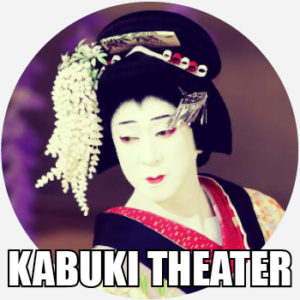Kabuki theater
or Kabuki dance or Kabuki play or Kabuki
[kah-boo-kee thee-uh-tur]
or [kah-boo-kee dans]
or [kah-boo-kee pley]
What does Kabuki theater mean?
Kabuki is a form of classical theater in Japan known for its elaborate costumes and dynamic acting. The phrases Kabuki theater, kabuki dance, or kabuki play are sometimes used in political discourse to describe an event characterized more by showmanship than by content.
Where does Kabuki theater come from?

As it’s commonly derived, the word kabuki combines the Japanese words ka (“song”), bu (“dance”), and ki (“skill”). However, The Japan Times reports that kabuki comes from the verb kabuku, meaning “to slant or to sway” and is used to describe “people who were out of the ordinary and preferred to dress in extravagant attire.” As an art form, Kabuki is characterized by colorful costumes, music, stylized performances, and broad dramatic postures and gestures called kata. With plots often derived from historic warriors and scholars, common themes include honor, justice, and order.
Westerners encountered Kabuki in the 19th century and early 20th century. In 1867, James Curtis Hepburn’s Japanese-English dictionary defined Kabuki as “a kind of opera.” In 1938, Japan’s Board of Tourist Industry produced a pamphlet to explain Kabuki to visitors.
American political pundits began to describe political showmanship and posturing as Kabuki in the early 1960s, with one early instance in 1962 characterizing President Kennedy’s New Frontier policy as “financial kabuki” making for a “colorful, carefree sight.”
In 1966, Ben Anderson, a scholar of Indonesian culture, explicitly compared the Japanese occupation of Indonesia to Kabuki. Anderson argued that the Japanese government used the elements of Kabuki, including, “mysterious silences, lightening changes of mood, terrifying grimaces, spectacular acrobatics and sumptuous pageantry” to control the Indonesians. That characterized Japanese foreign relations of the time as more theatrical than substantial. Since then, kabuki has been used to describe political drama and pageantry in the United States, Japan, and elsewhere.
Examples of Kabuki theater
Thus are the U.S. politics of the Iraq war a Kabuki performance, punctuated by occasional moments of Democratic jujitsu
Over the years, Winfrey’s resistance to booking politicians softened, and not because of a sudden willingness to perform the conversational kabuki of the traditional stump-speech interview...
A Bannon no-show under subpoena would be a major test of Congress’s resolve:If serious, Conaway will schedule a contempt vote
If not, it’s all Kabuki theater
Who uses Kabuki theater?
Kabuki theater is still commonly used by Western political pundits across the political spectrum. Kabuki, Kabuki theater, and Kabuki dance are used interchangeably in punditry. Some have argued that this use of Kabuki is a misunderstanding of the artform, contrasting the form’s subtleties and nuances with the political meaning of “empty show.” However, some commentators do use Kabuki to indicate the complexities of political performance as opposed to a shorthand for “style over substance.”
Of course, Kabuki and Kabuki theater are still used to talk about the theatrical form, as well.
NOTE
This is not meant to be a formal definition of Kabuki theater like most terms we define on Dictionary.com, but is rather an informal word summary that hopefully touches upon the key aspects of the meaning and usage of Kabuki theater that will help our users expand their word mastery.